An Ecommerce Manager oversees the online sales and presence of a company. They are responsible for managing the entire e-commerce strategy, from marketing and sales to customer service and logistics, ensuring a smooth and profitable online shopping experience.
Ecommerce Manager skills include proficiency in digital marketing, data analysis, and customer relationship management (CRM) systems, as well as abilities in project management and strategic planning.
Candidates can write these abilities in their resumes, but you can’t verify them without on-the-job Ecommerce Manager skill tests.
In this post, we will explore 9 essential Ecommerce Manager skills, 11 secondary skills and how to assess them so you can make informed hiring decisions.
Table of contents
9 fundamental Ecommerce Manager skills and traits
The best skills for Ecommerce Managers include Data Analysis, SEO Knowledge, Inventory Management, Customer Service, Digital Marketing, UX/UI Design, Financial Acumen, Technical Proficiency and Project Management.
Let’s dive into the details by examining the 9 essential skills of a Ecommerce Manager.
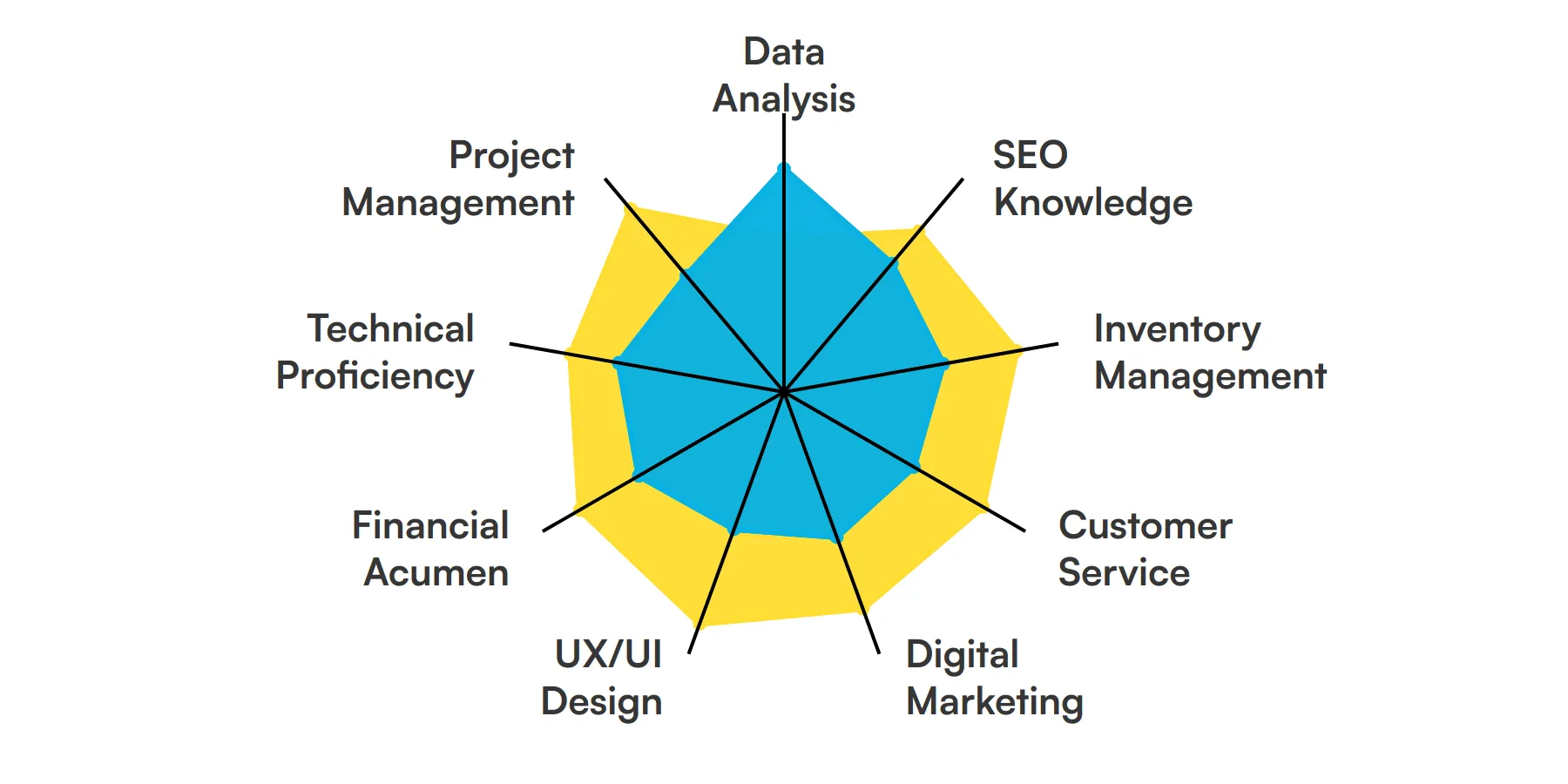
Data Analysis
An Ecommerce Manager must be adept at data analysis to interpret sales data, customer behavior, and market trends. This skill helps in making informed decisions to optimize product listings, pricing strategies, and marketing campaigns.
For more insights, check out our guide to writing a Data Analyst Job Description.
SEO Knowledge
Understanding SEO is crucial for an Ecommerce Manager to ensure that the online store ranks well on search engines. This involves optimizing product descriptions, meta tags, and other on-page elements to drive organic traffic.
Inventory Management
Effective inventory management ensures that the right products are available at the right time. An Ecommerce Manager uses this skill to balance stock levels, reduce holding costs, and avoid stockouts or overstock situations.
Customer Service
Providing excellent customer service is key to retaining customers and building brand loyalty. An Ecommerce Manager must handle customer inquiries, complaints, and returns efficiently to maintain a positive shopping experience.
Check out our guide for a comprehensive list of interview questions.
Digital Marketing
Digital marketing skills are essential for promoting products and driving traffic to the online store. This includes knowledge of PPC, email marketing, social media advertising, and content marketing strategies.
UX/UI Design
A good understanding of UX/UI design helps an Ecommerce Manager create a user-friendly and visually appealing online store. This skill is important for improving the customer journey and increasing conversion rates.
For more insights, check out our guide to writing a UI/UX Designer Job Description.
Financial Acumen
Financial acumen is necessary for budgeting, forecasting, and financial planning. An Ecommerce Manager uses this skill to ensure the profitability and financial health of the online store.
Technical Proficiency
Being technically proficient allows an Ecommerce Manager to work effectively with ecommerce platforms, CMS, and other software tools. This skill is crucial for managing the backend operations of the online store.
Project Management
Project management skills help in coordinating various tasks and teams to ensure timely execution of ecommerce projects. This includes launching new products, website updates, and marketing campaigns.
11 secondary Ecommerce Manager skills and traits
The best skills for Ecommerce Managers include Copywriting, A/B Testing, CRM Management, Email Marketing, Social Media Management, Market Research, Vendor Management, Content Creation, Analytics Tools, Payment Systems and Mobile Optimization.
Let’s dive into the details by examining the 11 secondary skills of a Ecommerce Manager.
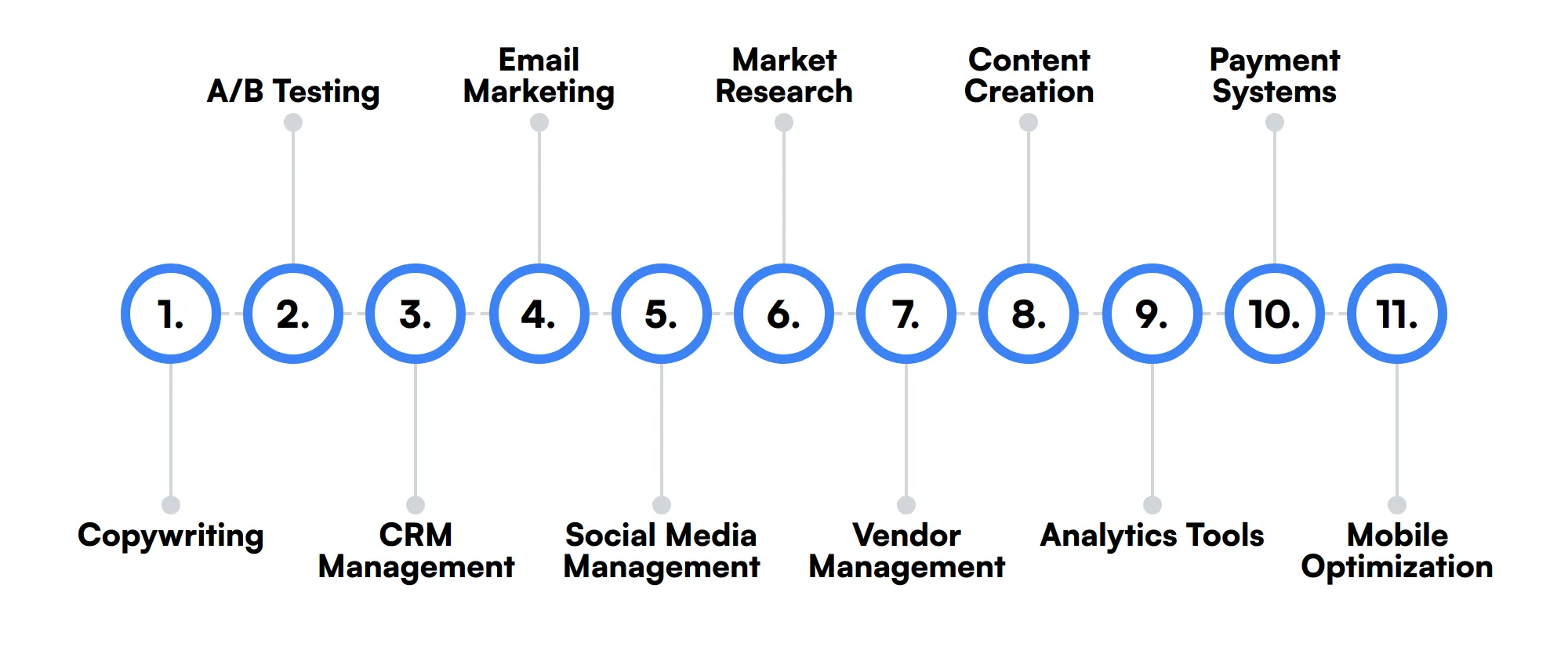
Copywriting
Good copywriting skills are useful for creating compelling product descriptions, blog posts, and marketing materials that engage customers and drive sales.
A/B Testing
A/B testing skills help in optimizing various elements of the online store, such as product pages and marketing campaigns, by comparing different versions to see which performs better.
CRM Management
Managing customer relationship management (CRM) systems is important for tracking customer interactions and improving customer retention strategies.
Email Marketing
Email marketing skills are useful for creating and managing email campaigns that nurture leads, promote products, and drive repeat purchases.
Social Media Management
Managing social media accounts helps in building brand awareness, engaging with customers, and driving traffic to the online store.
Market Research
Conducting market research helps in understanding customer needs, identifying market trends, and staying ahead of competitors.
Vendor Management
Vendor management skills are important for negotiating with suppliers, managing relationships, and ensuring timely delivery of products.
Content Creation
Creating high-quality content, such as blog posts, videos, and infographics, helps in attracting and engaging customers.
Analytics Tools
Proficiency in analytics tools like Google Analytics helps in tracking website performance, understanding user behavior, and making data-driven decisions.
Payment Systems
Understanding various payment systems and gateways is important for ensuring smooth and secure transactions for customers.
Mobile Optimization
Optimizing the online store for mobile devices is crucial as a significant portion of ecommerce traffic comes from mobile users.
How to assess Ecommerce Manager skills and traits
Assessing the skills and traits of an Ecommerce Manager involves a nuanced understanding of both technical and interpersonal capabilities. These professionals must excel in areas ranging from Data Analysis to UX/UI Design, ensuring they can handle the multifaceted challenges of the ecommerce world.
While resumes provide a snapshot of qualifications, they often fall short in showcasing a candidate's practical expertise and ability to integrate into your specific business environment. This is where practical assessments come into play, offering a deeper insight into a candidate's real-world capabilities.
For a comprehensive evaluation, consider using Adaface assessments, which are designed to measure a wide array of skills including SEO Knowledge, Digital Marketing, and Technical Proficiency. These tests provide a hands-on way to assess how well a candidate understands the necessary tools and strategies to succeed in an ecommerce role. By integrating Adaface assessments, you can achieve a 85% reduction in screening time, ensuring you focus only on the most promising candidates.
Let’s look at how to assess Ecommerce Manager skills with these 6 talent assessments.
Data Analysis Test
Our Data Analysis Test evaluates a candidate's ability to analyze and interpret data effectively, crucial for making informed business decisions.
The test assesses skills in data modeling, SQL queries, and data interpretation, including the use of popular tools like Excel for business analysis.
Candidates proficient in this test can predict outcomes, detect anomalies, and provide actionable insights through data visualization and statistical analysis.

PPC Assessment Test
Our PPC Assessment Test measures a candidate's expertise in pay-per-click advertising, a key component of digital marketing strategies.
This test covers keyword research, ad copywriting, campaign optimization, and conversion tracking to evaluate a candidate's ability to manage and optimize advertising budgets.
Successful candidates demonstrate a thorough understanding of PPC dynamics and can effectively analyze and report on campaign performance.
Customer Service Test
Our Customer Service Test assesses a candidate's ability to handle customer interactions with professionalism and empathy.
The test evaluates communication, problem-solving, and conflict resolution skills, essential for maintaining excellent customer service standards.
High scorers are adept at understanding customer needs, providing effective solutions, and ensuring a positive customer experience.
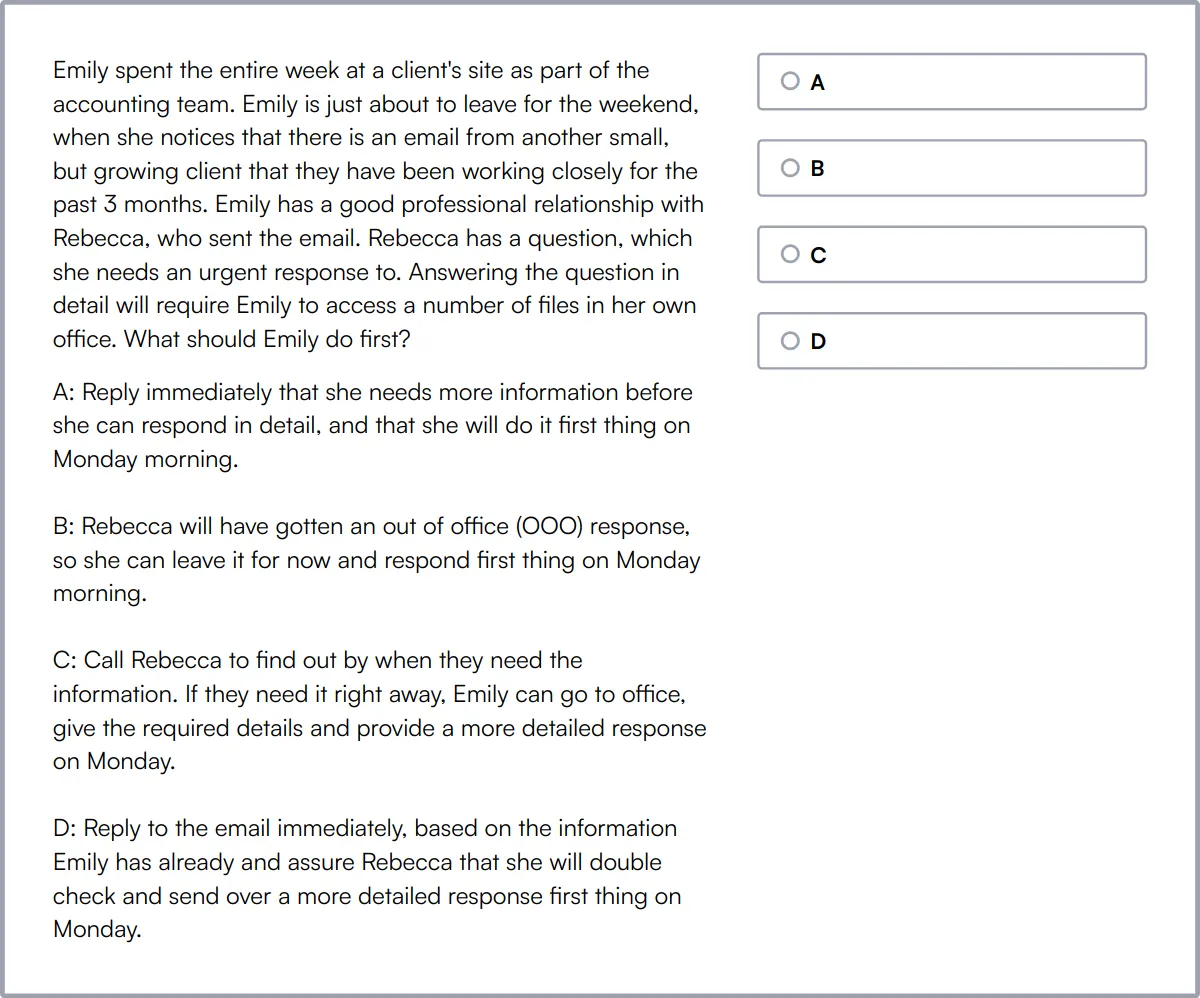
Digital Marketing Test
Our Digital Marketing Test assesses a candidate's capability in various digital marketing channels and techniques.
It includes testing knowledge in SEO, Google Ads, social media marketing, and analytics to gauge a candidate's ability to drive and measure online engagement.
Candidates excelling in this test can strategize, execute, and optimize digital marketing campaigns that achieve business objectives.
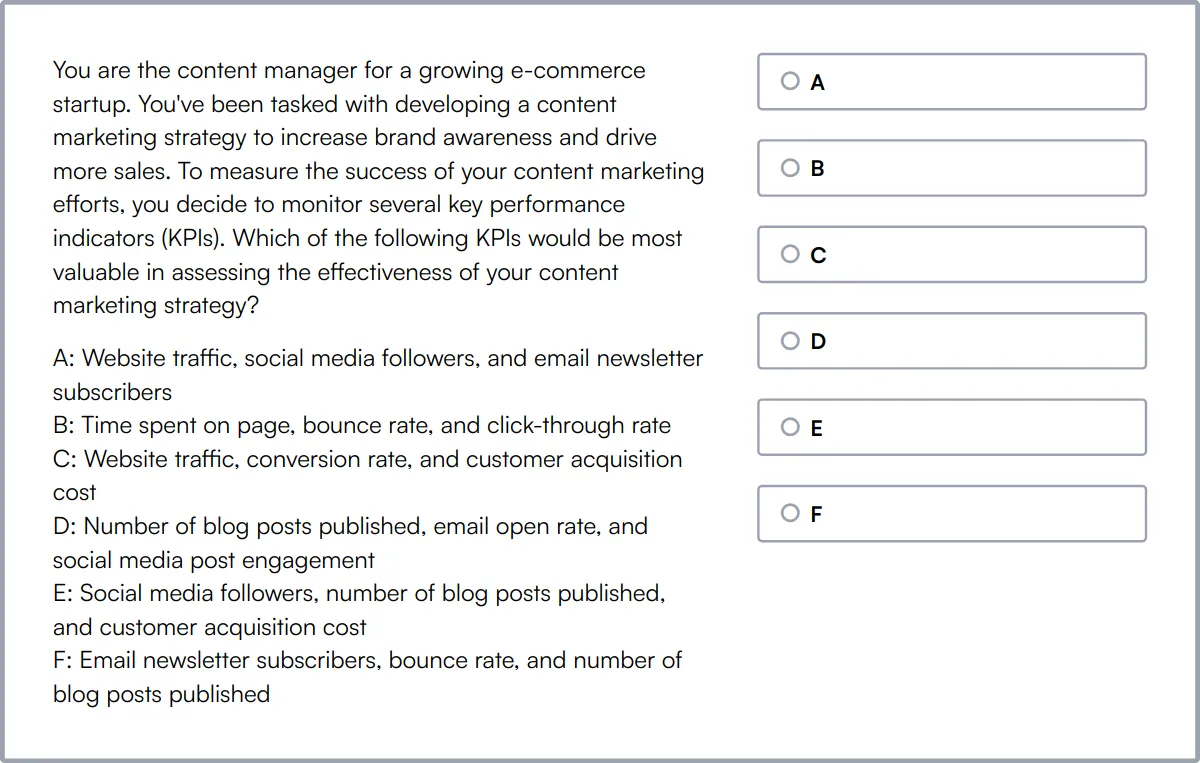
UI/UX Design Test
Our UI/UX Design Test evaluates a candidate's design skills, focusing on creating intuitive and effective user interfaces.
The test challenges candidates with principles of design thinking, user research, and visual design to determine their ability to deliver user-centered design solutions.
Proficient candidates demonstrate strong competencies in wire-framing, prototyping, and user testing, ensuring accessible and engaging digital experiences.
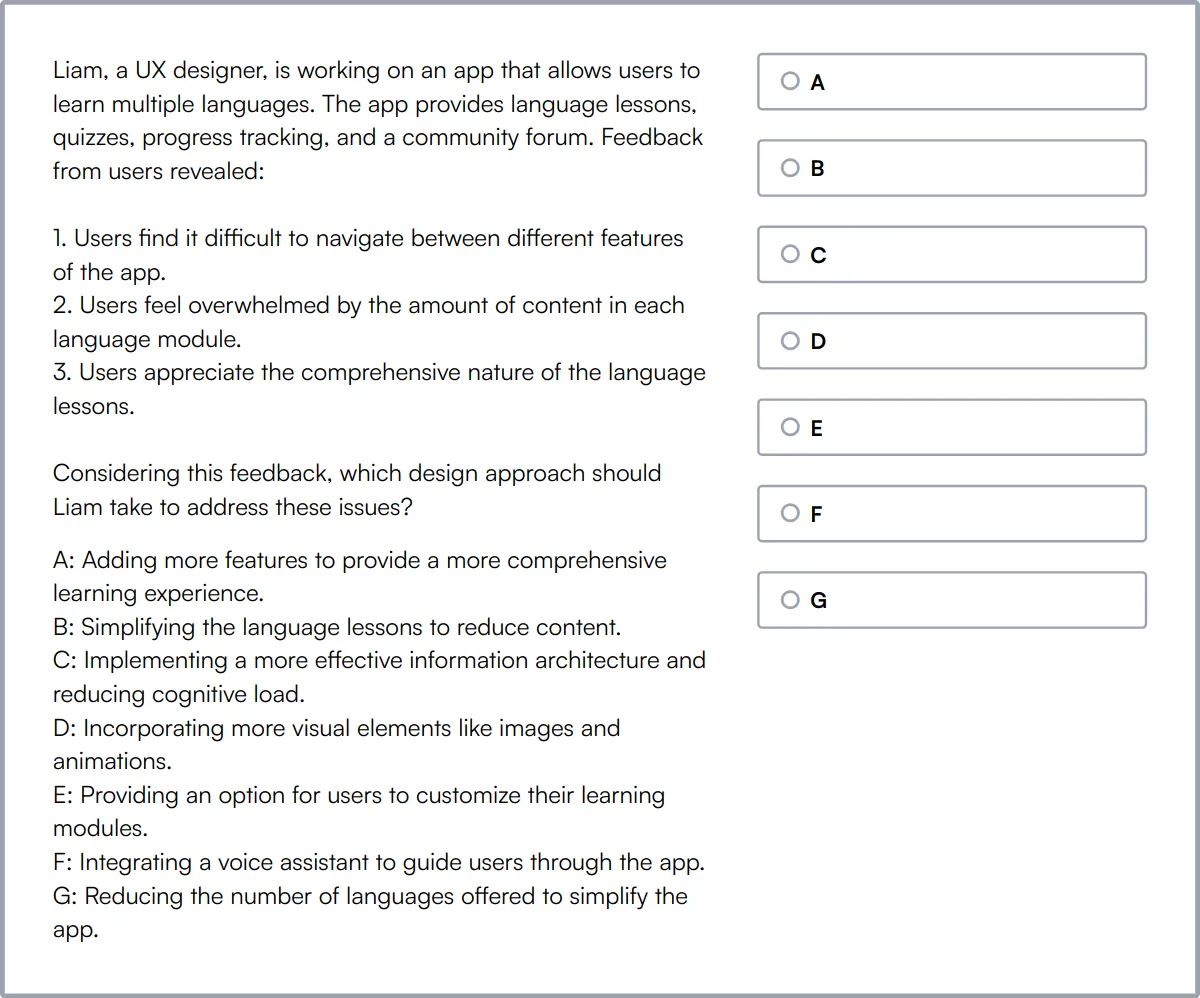
Financial Accounting Online Test
Our Financial Accounting Online Test gauges a candidate's knowledge in accounting principles and financial reporting.
This test evaluates understanding of financial statements, double-entry bookkeeping, and financial analysis to ensure candidates can manage company finances accurately.
Skilled candidates can interpret financial data, adhere to accounting standards, and communicate financial information effectively to stakeholders.
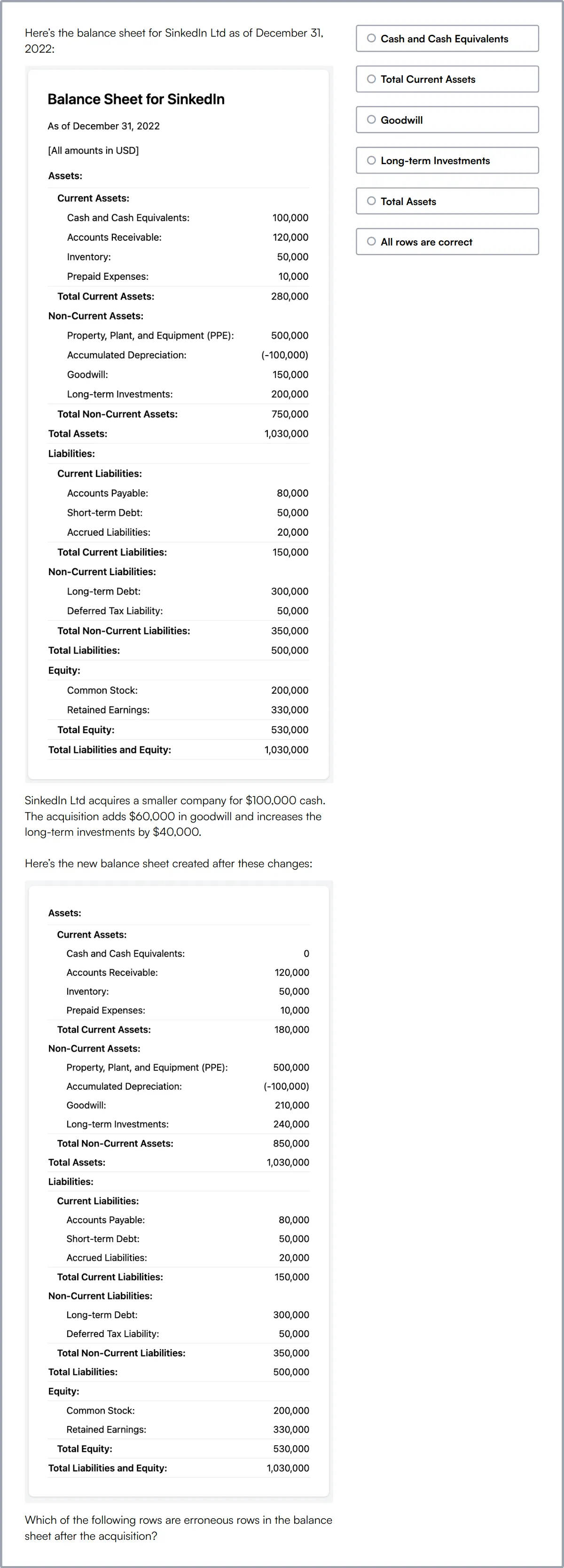
Summary: The 9 key Ecommerce Manager skills and how to test for them
| Ecommerce Manager skill | How to assess them |
|---|---|
| 1. Data Analysis | Evaluate ability to interpret data and derive actionable insights. |
| 2. SEO Knowledge | Assess understanding of search engine algorithms and optimization techniques. |
| 3. Inventory Management | Check skills in tracking and managing stock levels effectively. |
| 4. Customer Service | Gauge proficiency in handling customer inquiries and resolving issues. |
| 5. Digital Marketing | Measure expertise in online advertising and promotional strategies. |
| 6. UX/UI Design | Evaluate capability to design user-friendly and visually appealing interfaces. |
| 7. Financial Acumen | Assess understanding of budgeting, forecasting, and financial planning. |
| 8. Technical Proficiency | Check familiarity with ecommerce platforms and related technologies. |
| 9. Project Management | Gauge ability to plan, execute, and oversee projects to completion. |
Digital Marketing Test
Ecommerce Manager skills FAQs
What are the key skills needed for an Ecommerce Manager?
An Ecommerce Manager should be skilled in areas like SEO, digital marketing, data analysis, UX/UI design, and customer service. They also need to manage inventory, handle financials, oversee project management, and be proficient in various analytics and CRM tools.
How can recruiters assess a candidate's SEO knowledge for an Ecommerce Manager role?
Recruiters can assess SEO knowledge by asking candidates to describe past SEO projects, discuss the results they achieved, and explain how they stay updated with SEO trends. Practical tests or case studies can also be effective.
What tools should an Ecommerce Manager be familiar with?
Ecommerce Managers should be familiar with analytics tools like Google Analytics, CRM software like Salesforce, email marketing platforms like Mailchimp, and various payment systems. Knowledge of Adobe Creative Suite for content creation is also beneficial.
How important is customer service in the role of an Ecommerce Manager?
Customer service is critical as it directly affects customer satisfaction and retention. Ecommerce Managers should know how to manage customer service teams, utilize CRM tools, and implement strategies that enhance the customer experience.
What is the role of A/B testing in ecommerce management?
A/B testing is used by Ecommerce Managers to optimize website and campaign performance. It involves comparing two versions of a web page or campaign to see which performs better, thereby helping in making data-driven decisions.
Why is financial acumen important for an Ecommerce Manager?
Financial acumen is important as it helps Ecommerce Managers budget, forecast sales, manage cost, and analyze financial data to make strategic decisions that align with business goals.
How can project management skills be assessed during the hiring process for an Ecommerce Manager?
Project management skills can be assessed by asking candidates about their experience with managing ecommerce projects, their approach to handling deadlines, and their ability to coordinate with different teams. Scenario-based questions can also provide insight into their project management style.
What makes mobile optimization a necessary skill for Ecommerce Managers?
With the increasing use of mobile devices for shopping, mobile optimization is necessary to ensure a seamless shopping experience. This includes responsive design, mobile-friendly navigation, and optimized checkout processes.
Assess and hire the best Ecommerce Managers with Adaface
Assessing and finding the best Ecommerce Manager is quick and easy when you use talent assessments. You can check out our product tour, sign up for our free plan to see talent assessments in action or view the demo here:

40 min skill tests.
No trick questions.
Accurate shortlisting.
We make it easy for you to find the best candidates in your pipeline with a 40 min skills test.
Try for freeRelated posts
Free resources



